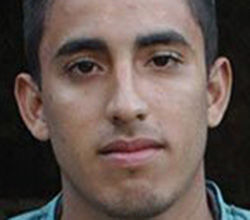Rest easy.
No problem.
Don’t worry so much.
That’s the message President Trump sent to the people protected under the Deferred Action for Childhood Arrivals program in an interview published Friday by the Associated Press. He actually said of them, “The Dreamers should rest easy.”
Trump added, “We are not after the Dreamers, we are after the criminals.”
If so, they have a funny way of showing it.
On several occasions since Trump took office, immigration officials have arrested so-called “Dreamers” — those who have received DACA status. And naturally, the DACA recipients around the country hear about it and fear.
The latest arrest to be revealed, in reporting last week by USA Today, actually took place two months ago.
On Feb. 19, immigration officials deported Juan Manuel Montes, a 23-year-old in Calexico, California, brought into the country at age 9. The circumstances surrounding his arrest are contested — he left the country involuntarily Feb. 17, his attorneys said, and was found re-entering the country illegally in Calexico on Feb. 19. He wasn’t carrying the papers showing he has DACA status until 2018. Immigration officials said his attempted illegal entry into the country is what caused them to kick him out.
He was the first DACA recipient known to have been deported during Trump’s presidency, but not the only arrest.
Daniel Ramirez, 24, was arrested Feb. 10 near Seattle despite his DACA status and the fact he arrived in the country at age 7. Immigration agents showed up to arrest his father, a previously deported felon and legitimate target, and took Ramirez in as well. They said Ramirez was a gang member, something his supporters vigorously denied, pointing to his clean record. He was released on bond March 30.
Then there was the disturbing case of Daniela Vargas, a 22-year-old Mississippi resident brought to the country from Argentina at age 7 by parents who overstayed their visa. Vargas spoke at a press conference at City Hall in Jackson, Mississippi, on March 1 and was pulled over afterward by immigration agents. Vargas had twice renewed her DACA status, which lasts two years, but had allowed it to lapse this year because she didn’t have the $495 fee. Obviously, paying that fee, however expensive, and renewing their status should be a Dreamer’s top priority.
There have been other cases, despite Trump’s reassurances. It’s a shame because, of course, these young adults took a risk when they came out from the shadows and provided their personal information to the federal government and because DACA is not a carte blanche to do whatever you want and stay in the country. Among the terms of the program, recipients must:
- Have been brought into the country when they were under age 16, before June 15, 2007.
- Have graduated from high school, be in school, or be an honorably discharged veteran of the armed forces.
- Not have been convicted of a felony or significant misdemeanor or pose a threat to public safety.
If they violate the terms of the program by committing a crime, of course they’ve given up their protected status and should have no expectation of staying in the country.
Before Jan. 20, it wasn’t hard to find Dreamers to interview — there are thousands in Arizona. Not so in the Trump era. His reassuring words don’t mean much if the agents of his administration are out arresting people anyway. And they especially don’t mean much if he isn’t doing anything to firm up their temporary status. So, they’re staying underground, as much as 750,000 or so people can.
“Strategic ambiguity” is a phrase that’s been used to describe Trump’s approach to many issues. He doesn’t commit, and that keeps people on their toes, giving him more power because they have to continue to please him. It looks like that’s what’s happening with the DACA issue. But it’s one thing to use strategic ambiguity when you’re a candidate or even a president dealing with a foreign nation.
It’s completely different when you’re toying with the lives of hundreds of thousands of people.
Politically speaking, you can see why Trump would turn noncommittal after taking office. During the campaign, as Trump gloried in the excited response to his anti-immigrant rhetoric, he vowed to eliminate President Barack Obama’s “executive amnesty” measures like DACA.
Many of his supporters love the idea of deporting anyone in the country illegally. It has a black-and-white appeal. That’s easier to support when you’ve never met a person brought to the country as a child who grew up speaking English in American schools and knows this country as their home. It’s harder when you’ve met the people and realize the jeopardy they’re under for reasons out of their control.
Trump has obviously realized they are sympathetic cases, politically difficult to turn against because by definition they were brought here as children and have done OK by graduating from school and not getting in serious trouble.
He ought to give them some security by committing to the program until Congress can pass a new immigration bill and by promising the government won’t deport Dreamers who haven’t done anything wrong themselves.
Then they can really rest easier.





